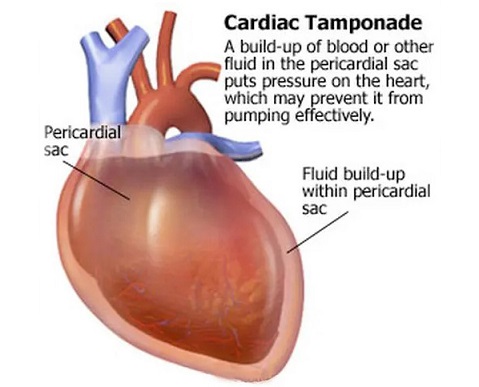COVID-19 News: Cardiologists Warn That Post COVID Subacute Hemorrhagic Pericardial Tamponade Can Mimic Carcinomatous Pericarditis!
Nikhil Prasad Fact checked by:Thailand Medical News Team Jan 10, 2024 2 years, 1 month, 6 days, 3 hours, 42 minutes ago
COVID-19 News: The global landscape has been significantly altered by the emergence of SARS-CoV-2, the virus responsible for the COVID-19 pandemic. While the respiratory implications of the virus are well-documented, the extrapulmonary manifestations, particularly in the cardiovascular system, continue to unveil themselves. One such manifestation garnering attention is acute pericarditis, often accompanied by pericardial tamponade (PT), a critical condition necessitating urgent intervention.
 Post-COVID Subacute Hemorrhagic Pericardial Tamponade
Post-COVID Subacute Hemorrhagic Pericardial Tamponade
However, the diagnostic challenges persist, particularly when presented with non-specific signs and symptoms. This
COVID-19 News report delves into an intricate case report from Narita-Tomisato Tokushukai Hospital, Chiba-Japan, Tokyo Medical University Hospital-Japan, and Asahi General Hospital-Japan, shedding light on a rare instance of post-COVID subacute hemorrhagic pericardial tamponade that initially mimicked carcinomatous pericarditis.
Case Description
The focal point of this case revolves around a 64-year-old man admitted to the hospital for acute osteomyelitis of the toes. The initial management involved successful treatment with antimicrobial agents. However, three days post-admission, the patient contracted mild COVID-19, without pneumonia, prompting the initiation of early anti-COVID-19 agents.
Remarkably, two weeks later, the patient experienced a severe turn of events, developing hemorrhagic PT due to acute pericarditis. The urgency of the situation was confirmed by cardiac magnetic resonance imaging, leading to the necessity of an immediate pericardiocentesis. Initially, cytological analysis of the hemorrhagic pericardial fluid strongly suggested adenocarcinoma, leading to concerns about carcinomatous pericarditis. However, subsequent investigations revealed that the atypical cells were, in fact, mesothelial cells with reactive atypia.
Furthermore, imaging studies indicated lymph node swelling with abnormal 2-[18F]-fluoro-2-deoxy-D-glucose accumulation, raising suspicions of malignancy.
However, a biopsy examination revealed multiple non-caseating granulomas in the lymph node, diverting the diagnosis from malignancy. The temporal association between the preceding COVID-19 infection and the occurrence of subacute PT, without any other identifiable cause, ultimately led to the conclusive diagnosis of COVID-19-associated acute pericarditis. Treatment with anti-inflammatory agents and corticosteroids resulted in the complete resolution of symptoms, including improvements in the size of affected lymphadenopathies.
Clinical Lessons:
-
Unique Presentation Mimicking Malignancy: This case serves as the first report of COVID-19-associated pericarditis mimicking malignancy, emphasizing the diversity of presentations associated with the virus. The manifestation of hemorrhagic PT, initially suggestive of various underlying causes, underscores the significance of considering COVID-19 as a potential etiology.
r />
-Limited Efficacy of Early COVID-19 Treatment: Despite the prompt initiation of anti-COVID-19 agents in a patient with mild COVID-19, the subsequent development of ongoing active pericarditis leading to hemorrhagic PT raises concerns about the residual risk of pericardial involvement even in cases with early pharmacological intervention.
-Role of Advanced Imaging in Diagnosis: Traditional diagnostic criteria for acute pericarditis involve a combination of clinical symptoms, electrocardiogram changes, and echocardiographic findings. However, this case highlights the importance of T2-weighted cardiac MRI in cases where the traditional criteria are inconclusive. In this instance, the MRI played a crucial role in characterizing pericardial inflammation, leading to an accurate diagnosis.
-Effective Management with Ibuprofen and Corticosteroids: Despite theoretical concerns about the use of nonsteroidal anti-inflammatory drugs (NSAIDs) in COVID-19 patients, this case demonstrates the effective management of COVID-19-associated hemorrhagic pericarditis with ibuprofen and corticosteroids. The potential risks associated with NSAIDs use, including the upregulation of ACE2 and antiplatelet activity, were discussed, but the treatment did not show detrimental effects in this instance.
Exploring Underlying Mechanisms
The study delves into potential mechanisms underlying COVID-19-associated hemorrhagic pericarditis, offering a comprehensive understanding of the intricate interplay between the virus and the cardiovascular system. It discusses the direct impact of SARS-CoV-2 on cardiovascular tissues, the role of hyperinflammatory responses leading to vascular damage, and the possible involvement of dysregulated endothelial cell/pericyte interactions in the development of a hemorrhagic phenotype.
Conclusion
This detailed exploration of a unique case not only sheds light on the complexities associated with COVID-19-associated acute pericarditis but also emphasizes the need for clinicians to consider diverse presentations. The pericardium emerges as a crucial target of cardiovascular involvement, and the cytomorphological and histological features observed after COVID-19 infection require careful consideration. As the world grapples with the ongoing pandemic, such in-depth analyses contribute valuable insights into the multifaceted nature of COVID-19-related complications.
The complexities observed in this case underscore the importance of continuous research and vigilance in understanding the myriad ways in which SARS-CoV-2 can impact the human body. As the medical community confronts evolving challenges, the lessons learned from unique cases like this one provide essential knowledge for improved diagnostics, treatment strategies, and overall patient care. The global effort to combat the COVID-19 pandemic remains a dynamic and collaborative endeavor, with each case contributing to a deeper understanding of the virus and its implications on human health.
The case study was published in the peer reviewed journal: Frontiers in Cardiovascular Medicine.
https://www.frontiersin.org/articles/10.3389/fcvm.2023.1329952/full
For the latest COVID-19 News, keep on logging to Thailand Medical News.
